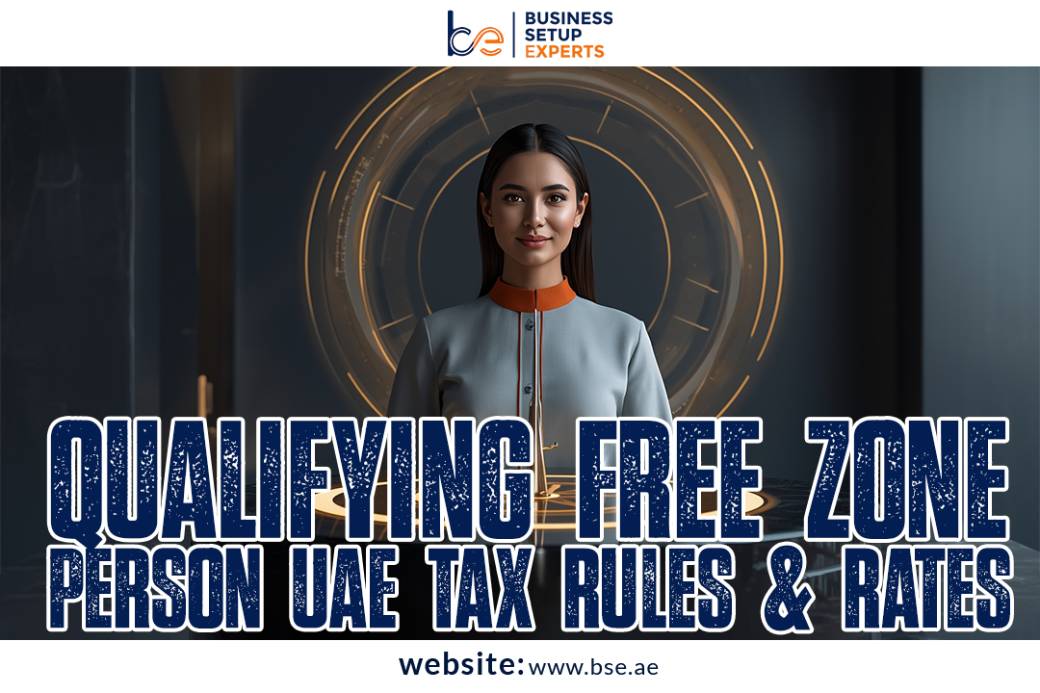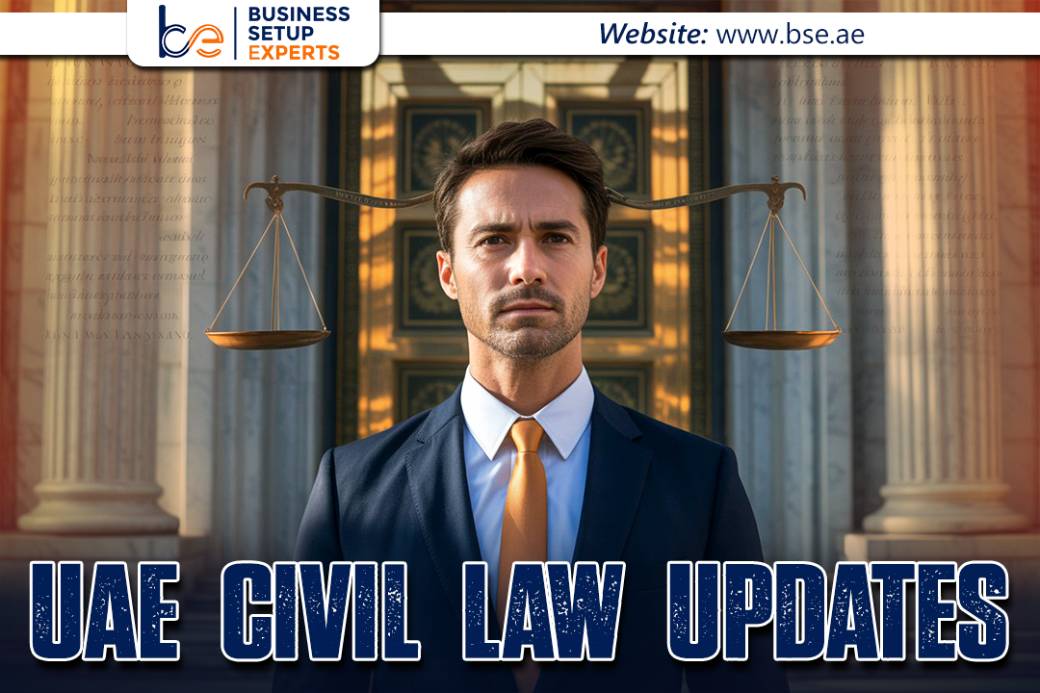Qualifying Free Zone Person in UAE Corporate Tax 2025: Eligibility, Rules, and Tax Rates Explained
The UAE is a country that has had a reputation for business-friendly regulations. Since time immemorial, free zones have implied 0% tax and easy establishment. This, however, changed when the corporate tax came in 2023. By 2025, the free zone companies will be forced to comply with new requirements. The Qualifying Free Zone Person UAE corporate tax is the name of it. Even if your company is a Qualifying Free Zone Person, you can pay 0%. If not, you may pay 9%. Let’s explore this in detail.
Understanding UAE Corporate Tax for Free Zone Person
In 2023, there was a new corporate tax in the UAE. Over the years, the free zones provided businesses with zero taxation. This is the reason why investors have been scurrying to start firms here. But global tax rules changed. The UAE was forced to conform to the OECD standards.
Now, any business should verify whether it is qualified. Special relief can still be enjoyed by the free zone firms. The relief, however, is conditional on the strict rules. This is the point where the concept of Qualifying Free Zone Person (QFZP corporate tax UAE) comes in.
Your company qualifies as the QFZP model, and you will be able to pay 0%. If not, you may pay 9%. Sounds simple, right? But the rules are deep. They include what you do, the way you earn, as well as whether you maintain audited accounts.
Why does this matter? Let’s take a simple case. Picture you establish a logistics company in JAFZA. When you transfer goods from a free zone to a free zone, it will be tax-free. However, taxes on the sale of services to a retailer on the mainland are 9%. Different clients, same firm, different tax.
What are Free Zones in the UAE?
Free zones are areas of special business. The UAE has developed them to attract global investors. The concept was not complicated: it was to provide easy company formation in Dubai and other emirates, as well as large benefits.
These are some of the characteristics of free zones:
- Full ownership: You do not need a local partner. You own your company 100%.
- Tax benefits: In the past, 0% tax. Now, still 0% for QFZPs.
- Basic regulations: Fast installation, fewer limitations.
- As a unique favor: hassle-free import and export, duty-free.
- Industry specialisation: Every free zone is themed. Dubai Media City for media. DIFC for finance. JAFZA for trade.
Free zones are well favored by both startups and multinationals. As an illustration, an e-commerce startup can be established in Dubai CommerCity. JAFZA may select a logistics company. They both receive tax and trade advantages.
But here’s the catch. All free zone businesses do not receive full tax relief anymore. The UAE has come up with regulations with which one should qualify. In MD 229 of 2025 QFZP rules, these rules are found. The Free zone company tax benefits UAE are robust even nowadays. But now they are reliant on qualifying conditions.
About UAE Corporate Tax in Free Zones
The new tax regulation provides the free zone companies with a special status. They can take the same 0% tax, but on qualified income.
The main aspects concerning the UAE corporate tax compliance free zones:
- Qualifying income = 0% tax.
- Non-qualifying income = 9% tax.
- Businesses will need to be registered at the FTA.
- Companies are required to file yearly tax returns.
- QFZP is now obliged to have audited accounts.
To say the least, a Dubai Internet City consultancy with clients abroad is paying 0%. However, the same consultancy catering to firms of the mainland UAE can pay 9%.
What is a Qualifying Free Zone Person (QFZP)?
The legislation defines a Qualifying Free Zone Person. The conditions are provided by Article 18 of the corporate tax law. A QFZP must:
- Be registered in a free zone.
- Earn qualifying income.
- Abide by transfer pricing rules.
- Keep audited accounts.
- Pass substance test (real office, staff, activity).
In case of any violation, the company will lose its QFZP status. Then it pays 9% tax on all income.
For Example, A shipping firm in Khalifa Industrial Zone is a rule-abiding company. It trades globally. It remains a QFZP. An audited account is omitted in a small marketing company in a free zone. It loses QFZP status.
Qualifying Free Zone Person Eligibility 2025
The requirements of the qualifying free zone person eligibility 2025 are more rigid. It was updated in 2025 by the Cabinet Decision MD 229. Now businesses must:
- Demonstrate physical presence in the UAE.
- Present audited financial statements on an annual basis.
- Avoid excluded activities.
- Limit non-qualifying income.
- Register and submit returns to FTA on time.
Even freelancers who are licensed according to the free zone have to check. Corporate tax can be paid if they make over AED 1 million. This implies that non-compliance is not optional. Lack of one of the requirements can change your tax rate to 0% or 9%.
What is a Qualifying and Non-Qualifying Activity?
Not all the businesses in the UAE free zones receive 0% tax. Qualifying vs excluded activities UAE are provided in the law. The ones to qualify are certain services and trades, and not others. This is the difference that can guide companies in their planning and remain in compliance.
Qualifying activities include:
Free zones in the UAE have a tax-free rate of corporate taxes. The law specially lists these activities. They can be beneficial to companies involved in them. The following are the key qualifying activities discussed in brief and concise statements.
- Manufacturing
Production or manufacturing of goods within the free zone is regarded as qualifying. This involves the assembling, production, or manufacturing of goods and the supply to other approved businesses.
- Processing goods
Qualifying activities include improving or reshaping goods in a free zone. It involves refining, packaging, or preparing products to be further approved for trade or exported.
- Reinsurance services
The reinsurance services provided are a qualifying activity. It enables firms to be involved in risk transfer to insurance firms, with the exclusion of direct insurance that is not permitted according to the free zone regulations.
- Holding shares
It is qualifying to have and operate shares of other companies. Under this activity, there is the ownership of equity interests, and the resultant returns are earned without actively trading and selling to the mainland markets.
- Logistics and shipping
Arranging transport, warehouse, or delivery of products is qualifying. It is used in cases where services are performed within the free zone or authorized global trade operations.
- IT and consulting services
It can be offered as IT solutions, digital support, or consultancy. The target of the services should be the free zone business or the international client rather than the unapproved mainland business. This comprises software, consultancy, and technology services.
- Headquarters services to group companies
It is qualified to manage or support group companies. These are HR services, finance services, administration services, or strategy services. It is used where the parent firm assists other parties within the group.
- Goods distribution within the free zones
The provision of goods in the free zones qualifies. It involves the storage, selling, and delivery of goods among the certified free zone companies. This activity does not allow mainland sales that are not approved.
Non-qualifying activities include
Not all the activities in a free zone of the UAE are tax-free at 0%. Some are not covered by the law. These are referred to as non-qualifying activities. Companies that are engaged in them can pay the normal 9% corporate tax.
- Trading with the mainland UAE without approval
Direct sales to customers in the mainland without the appropriate license are not eligible. This kind of trade violates the regulations and is subject to taxation according to the corporate taxation system.
- Banking and insurance
Banking, financing, and a majority of insurance services are not included. Only reinsurance qualifies. The regular insurance or lending activities within the free zones are not included in the list of exemptions, but rather in the taxable category.
- Earning interest not linked to operations
Non-qualifying passive income, such as bank interest or loans that are not related to any real business, is non-qualifying. This type of earnings is taxable because they are not involved in business operations.
- Mainland property real estate revenue
Income (rental or sale of mainland property) is ineligible. Companies that own free zones in the mainland are liable to tax on the income received on such real estate.
Tax Rates for Free Zone Persons
There are two rates applicable to free zone firms:
- 0% for qualifying income.
- 9% for non-qualifying income.
This is a rudimentary regulation that determines tax planning. Contracts are carefully structured by many businesses nowadays. They provide that the income be earned out of qualifying activities.
Indicatively, a logistics company ships products through JAFZA. This is qualifying. However, when the same company delivers to the mainland, Dubai, it might suffer 9%.
UAE Free Zone Corporate Tax 0% vs 9%
The UAE free zone corporate tax 0% vs 9% system is relatively equal. It rewards the compliance firms as well as taxing others.
Case Study:
- A Dubai media start-up with clients in Europe: 0%.
- The same startup to serve one of the Dubai mainland firms: 9%.
This demonstrates the significance of compliance. Intelligent companies would engage business establishment advisors in Dubai to plan contracts and minimise tax.
De Minimis Rule QFZP UAE
In some cases, a free zone company makes the non-qualifying income by accident. The de minimis rule QFZP UAE assists in this matter.
The rule says:
- The non-qualifying income should not exceed 5 per cent of revenue or AED 5 million.
- In this case, if the company retains 0% status.
- In case of the above, the entire income can be subjected to taxation at 9%.
Example: A company makes AED 50 million. When the mainland work issues are contained in the AED 2 million, then it is less than 5%. It keeps 0%. However, when AED 6 million is sourced on the mainland, it forfeits 0% benefit.
Audited Accounts Requirement for QFZP
The audited accounts requirement for QFZP is now tough. All persons eligible are required to submit audited accounts.
This is to:
- Prove transparency.
- Demonstrate adherence to FTA regulations.
- Build trust for investors.
Audits had been overlooked in small firms. Now they cannot. Books have to be kept even in small QFZPs. Failure translates to discontinuation of tax credits.
Example: A non-audited consultancy can lose nothing. The benefit is retained by another consultancy that has proper accounts.
PRO is Here to Help
The rules are complex. Many businesses feel lost. Business setup consultants in Dubai come in at this stage.
They help with:
- Tax planning.
- Filing with FTA.
- The establishment of companies in Dubai has tax advantages.
- Knowledge of the rules of MD 229 of 2025 of QFZP.
Contracting a business setup specialist in Dubai will help save time and avoid expensive errors.
FAQs
Q1: What is a Qualifying Free Zone Person UAE corporate tax?
A Qualifying Free Zone Person is a company that is a free zone. It must meet tax rules. It pays no tax on qualifying income only.
Q2: Can a free zone firm pay 9%?
Yes, one can pay 9 percent with a free zone company. In case its income is not qualifying as per the tax regulations, such portion of income is taxed at 9% corporate tax rate.
Q3: Do audited accounts matter?
Yes, audited accounts are very significant. The free zone business may not be considered as a Qualifying Free Zone Person in terms of corporate taxes without proper audited financial statements.
Q4: What would happen in the event of my business failing eligibility?
In case a company does not comply with the Qualifying Free Zone Person terms, it is deprived of the advantages. Thereafter, it is considered a non-qualifying person. Any income will be subject to tax at 9%.
Q5: Can individuals be taxed?
Yes, people may even be taxed. Individuals earning over AED 1 million per annum might be required to register as freelancers or self-employed. They may become the subject of UAE corporate tax regulations.
Conclusion
There are still high tax incentives in the UAE. But not for everyone. The Qualifying Free Zone Person UAE corporate tax system provides 0% only to real businesses.
In case you are a free zone company, verify this. Check your actions, earnings, and adherence. Keep proper accounts. Meet substance rules. Use the de minimis safety net.
And in case you are lost, refer to the business setup specialists in Dubai. Your company formation in Dubai can even have the 0% tax in 2025 with the right help.




